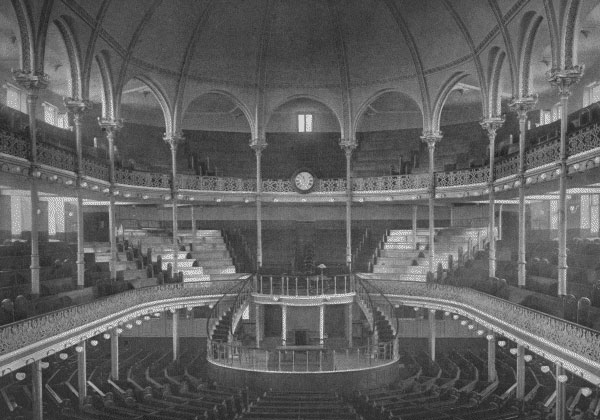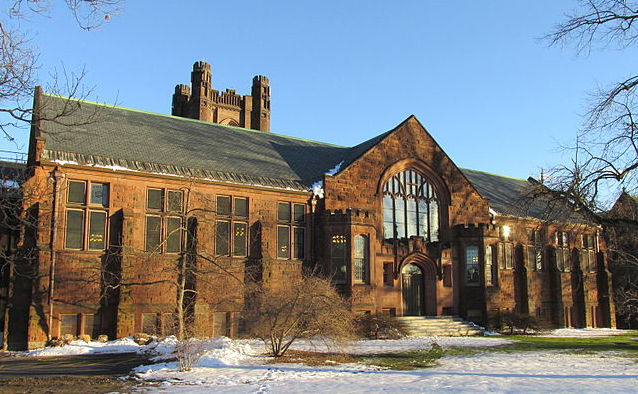In this post I am interviewing Darren Dochuk, author of the new book Anointed with Oil: How Christianity and Crude Made Modern America (Basic Books, 2019). Dochuk is associate professor of history at the University of Notre Dame, and a longtime friend of mine dating back to our PhD program at Notre Dame.
[TK] You describe Anointed with Oil as a “religious biography of a natural resource.” What gave you the idea to examine the connections between Christianity and the oil business in America?
[DD] This was part professional and part personal. While writing my first book—From Bible Belt to Sunbelt—I kept coming across influential oil executives who supported the religious and political institutions I was examining. Whether it concerned California governor Ronald Reagan’s “Kitchen Cabinet” of advisers, or Christian colleges such as Pepperdine and Biola, oilmen seemed almost omnipresent in the rise of California’s (and the Sunbelt’s) conservative movement. So I thought I might “follow the money” further and see how petroleum powerbrokers shaped the course of American religion and politics.
My roots in the Alberta oil patch factored in, too. I grew up there during a tough down cycle in oil (the 1980s), and I remember the perennial anxieties this caused in local politics (and in my church). Those memories became more pronounced as I researched the book. In a way, they also encouraged me to look past a follow-the-money narrative to other dimensions of faith and oil’s reciprocity. I started focusing more on the distinctiveness of oil-patch religious life itself and pondering how the disruptive economic cycles and dangers of the business helped shape belief in the pulpits and pews of these regions (be it Oklahoma and Texas or Alberta, the “Texas” of Canada). I also started wrestling more with oil’s outsized importance to the United States and its post-Civil War economic expansion on a global scale, and how the nation came to see its control of oil in sanctified terms—as a sign of the nation’s exceptionalism.
You note that there were sharply divergent religious attitudes in the oil industry, especially the clash between the “civil religion of crude” and “wildcat Christianity.” What divided those camps?
My use of the categories “wildcat Christianity” and “civil religion of crude” point to a central tension: the generations-long competition between two different sectors of U.S. petroleum and, correspondingly, of U.S. Protestantism. This clash reflected two dueling “spirits of capitalism.”
I identify the civil religion of crude with the major (fully integrated, multinational) oil companies of the east—Standard Oil and its offshoots—and with their controlling clan, the Rockefellers. Illustrative of Max Weber’s vision of a Protestant bureaucratic outlook, the Rockefellers sought to impose order on their chaotic corporate realm (and early oil was chaotic) and to reform society and transform the globe with a postmillennialist, ecumenical, social gospel—a gospel that saw oil money as a means to uplift humanity and essentially baptize people in their liberal, internationalist worldview.
I identify the ethic of wildcat Christianity with the independent oilmen who on account of the Rockefellers’ monopoly in Pennsylvania were forced to relocate west. Enraged by the Rockefellers’ control of their industry and that family’s liberal Protestantism, the wildcatters determined to protect their individual rights to drill exploratory wells (a process called “wildcatting”) and enjoy oil’s profits on their own terms. They shored up their core principles, which were intensely evangelical: They defended the autonomy of believers and the church, as well as orthodox theological convictions espoused in the 1915 publication The Fundamentals (a project independent oilman Lyman Stewart funded to offset Rockefeller-sponsored liberalism). They emphasized the primacy of soul-winning evangelism over social restructuring, in anticipation of Christ’s impending return. Because of the surprising shift of oil production to California and Texas at the turn of the 20th century, these independents—many of whom, like Stewart, were extremely devout—were able to build their own empires, and fight the Rockefellers for control of their industry, and ultimately of the American church.
Many of the leading figures in your book were evangelical Christians. To what extent has there been a special affinity for the oil business among evangelicals?
Evangelicals certainly operate at the heart of my story. Many oil executives were outspoken evangelicals who saw their business and service to the church as one vocation. Meanwhile, countless geologists, drillers, and roughnecks worked the oil fields with strong adherence to the Bible and a conviction that Christian principles informed their labors. So yes, I’d claim that there has always been a special affinity for the oil business among evangelicals.
There are additional factors to consider, however. One of them is coincidence. Be it western Pennsylvania or eastern Texas, Alberta, or Oklahoma: historically oil has been found in regions with extant affinities for evangelical Protestantism. Oil’s arrival intensified and reshaped preexisting evangelical sensibilities in these places. Typically among the first on the scene of a new oil discovery were locals who connected (theologically, institutionally) the petroleum business to their religious prerogatives.
Theological emphases have also tied evangelicalism to oil. My book shows how oil exploration elicited a highly emotive and spiritual response. The science of petroleum geology took time to develop; as late as the 1930s, oil hunters often relied on their senses and prayer to locate their treasure. Lyman Stewart hunted oil with his nose. Unlike the pursuit of other minerals, oil nurtured a wonderment with the world that tapped into evangelical sensibilities. Moreover, while oil’s location was mysterious, its arrival was spectacular, and a trigger for religious euphoria (including gratitude to God). And oil’s dark side—frequent fires and death, accompanying immorality—was equally potent in stirring up campaigns for revival and reform. So was oil’s impending depletion. Oilfields’ production capacities are fleeting, and oil-patch residents always knew that the end of their prosperous era would come—suddenly and decisively.
So in oil country, certain varieties of evangelicalism—from gospels of health and wealth to notions of the end times—have found fertile soil.
You show that oilmen made a huge institutional imprint on the Christian landscape (mainline, evangelical, and Catholic) through financial support for organizations such as the National Council of Churches, the Pew Charitable Trusts, and the Billy Graham crusades, and for schools such as Biola, Baylor, and Notre Dame. To what extent do you think that faith also shaped the practices, or the malpractices, of the industry itself?
Faith shaped the practices and in certain situations malpractices of the industry in a number of ways. Oil historians may be surprised to hear it, but in some instances oil’s corporate structures evolved directly out of the theological commitments of its leaders. Consider two examples.
The first is Aramco, the Saudi entity that is now the most profitable corporation in the world. Through its first decades of development under the management of Standard California (Chevron), Aramco constructed an apparatus of religious oversight and exchange. Due to the sensitivities of doing work in a Muslim country, Aramco established an entire department charged with educating workers in Islam, promoting ecumenical encounter on drill sites and faith-based notions of international brotherhood in the boardroom, and overseeing an unofficial, underground network of Protestant and Catholic “moral groups” (home churches). Faith, in this context, had a direct bearing on the organizational structure of the oil company.
Then there’s the Great Canadian Oil Sands (GCOS), a corporation started in the 1950s to extract and process the Athabasca oil sands in northern Alberta. Alberta’s premier, Ernest Manning, was a devout Christian who in addition to running the province preached on radio and in pulpits around the continent. Wanting to develop the oil sands, he looked for investors and found one in J. Howard Pew, head of Sun Oil Company. Because of their shared evangelical commitments, the two formed a partnership that by the 1960s resulted in the opening of the first GCOS plant. Here too faith led to concrete corporate outcomes.
Faith led to some instances of malpractice as well. Speculative impatience plagued the business, and some of this affected the church. In Lyman Stewart’s day, there was no shortage of oil companies that counted on investment from church folks. Stewart built his company with funds from those with whom he worshiped. Stewart made good on his promises, but countless other speculators and startup companies failed, leaving entire congregations broke. And throughout oil’s history there’s been a get-rich-quick tendency, as well as a concern only for short-term economic gain, not long-term human, communal, and environmental consequences. On occasion those tendencies have stemmed from the urgencies of Christian oilmen, churches, and church folk to obtain black gold quickly in order to fund ministries and missionaries, and to spread the gospel.
Christians have played a major role in other American industries, maybe most obviously the retail sector (Chick-Fil-A, Hobby Lobby, Walmart). Have Christians played an unusually prominent role in the oil industry, or is yours a replicable history because devout Christians are present in a lot of top businesses?
I’d suggest that Christians have played an unusually prominent role in the oil industry. Certainly it is fair to see my book as one chapter in a larger story of how faithful Christians have profoundly shaped American industries across the board. Yet I think the oil industry has been particularly receptive to Christians and Christian values. Oil has always been seen as a business in which the combination of entrepreneurialism and certainty of belief can produce quick and spectacular outcomes. My book charts this dynamic across generations, and the efforts of evangelical entrepreneurs—including evangelists such as Charles Fuller—to form oil companies in order to garner funds rapidly for service to the church. Put another way, unlike other economic sectors where a good degree of overhead and patience are required, petroleum has always nurtured and celebrated the myth that with a little luck and a lot of prayer, anyone can make it big. On more than one occasion that has proved to be true, lending it legitimacy.
The sheer scale of the petroleum industry has helped generate special interest among Christians as well, particularly when we look to the world stage. Beginning in the 19th century, the oil industry was always a global venture, with American geologists and oilmen taking the lead in exploration and production abroad. Countless numbers of them seamlessly linked their faith and professional labor; to open new territories up to oil was, in their minds, a step toward the spiritual uplift of humanity. Be it in the Middle East or South America, missionaries always played key roles in this process (as guides and liaisons, for instance), further embedding Christians at the heart of the oil business. Finally, there is a prophetic element involved. For many evangelical oilmen, the work they conducted (and are continuing to conduct) in the Middle East—Israel in particular—has been an outgrowth of their end-times beliefs and commitment to the Holy Land. As far as I can tell, no other corporate sector generates that form or intensity of Christian conviction.
Sign up here for the Thomas S. Kidd newsletter. It delivers unique content only to subscribers.

















